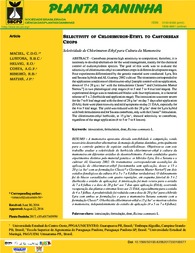Selectivity of Chlorimuron-Ethyl to Castorbean Crops.
Selectivity of Chlorimuron-Ethyl to Castorbean Crops.
Author(s): MACIEL, C. D. G.; LUSTOSA, S. B. C.; COSTA, A. G. F.; RIBEIRO, R. B.; MATIAS, J. P.
Summary: Castorbean presents high sensitivity to competition; therefore, it is necessary to develop alternatives for the weed management, mainly for the chemical control of eudicotyledons species. The goal of this work was to evaluate the selectivity of chlorimuron-ethyl to castorbean crops in different development stages. Four experiments differentiated by the genetic material were conducted: Lyra, Íris and Savana hybrids and AL Guarany 2002 cultivar. The treatments corresponded to the application conditions of chlorimuron-ethyl [sample control with no application, doses of 15 e 20 g a.i. ha-1 with the formulations Classic? and Clorimuron Master Nortox?] in two phenological crop stages (4 to 5 and 7 to 8 true leaf stages). The experimental design was in randomized blocks with four replications, in a factorial scheme of 5 x 2 (herbicide and application stage). The intoxication was more severe for the 7 to 8 leaf stage and with the dose of 20 g ha-1 on day 7 days after application (DAA); there were plant recovery and mild symptoms on day 21 DAA, especially for the 4 to 5 leaf stage. The yield was reduced with the 20 g ha-1 dose for Lyra hybrid with both formulations and for Savana castorbean, only with the Classic? formulation. The chlorimuron-ethyl herbicide, at 15 g ha-1, showed selectivity to castorbean, regardless of the stage application (4 to 5 or 7 to 8 leaves).
Publication year: 2017
Types of publication: Journal article
Unit: Embrapa Cotton
Keywords: Crops, Herbicida, Herbicides, Intoxication, Intoxicação, Mamona, Ricinus communis
Observation
Some of Embrapa's publications are published as ePub files. To read them, use or download one of the following free software options to your computer or mobile device. Android: Google Play Books; IOS: iBooks; Windows and Linux: Calibre.
Access other publications
Access the Agricultural Research Database (BDPA) to consult Embrapa's full library collection and records.
Visit Embrapa Bookstore to purchase books and other publications sold by Embrapa.

